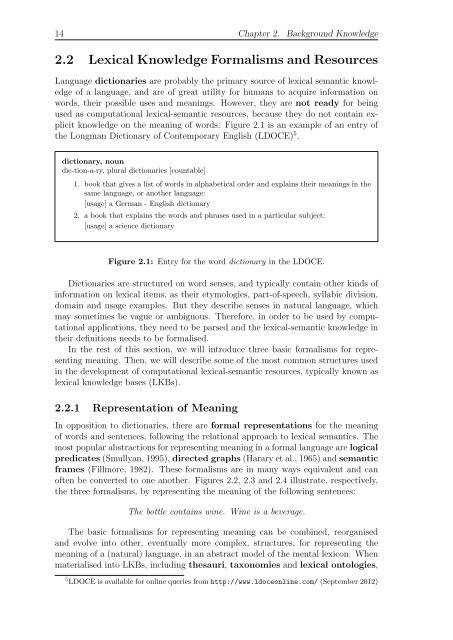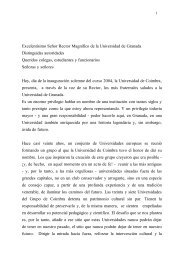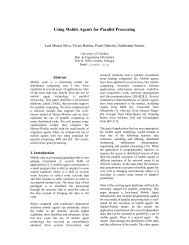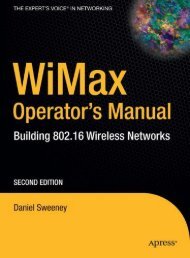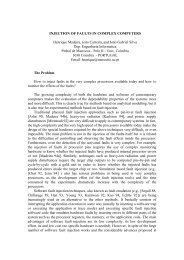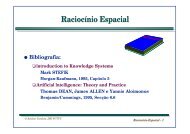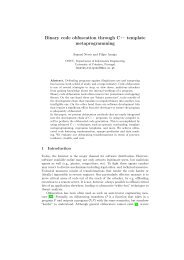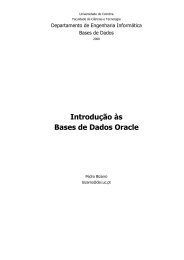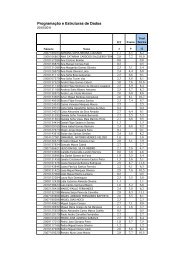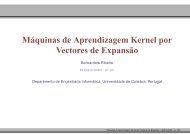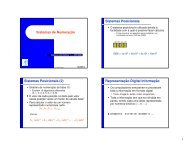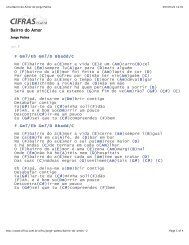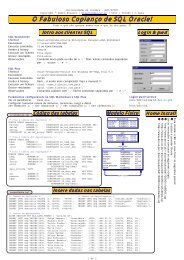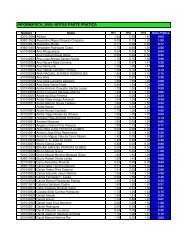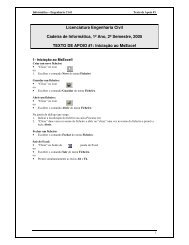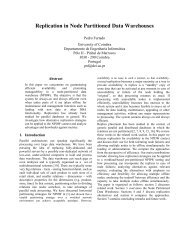Onto.PT: Towards the Automatic Construction of a Lexical Ontology ...
Onto.PT: Towards the Automatic Construction of a Lexical Ontology ...
Onto.PT: Towards the Automatic Construction of a Lexical Ontology ...
You also want an ePaper? Increase the reach of your titles
YUMPU automatically turns print PDFs into web optimized ePapers that Google loves.
14 Chapter 2. Background Knowledge<br />
2.2 <strong>Lexical</strong> Knowledge Formalisms and Resources<br />
Language dictionaries are probably <strong>the</strong> primary source <strong>of</strong> lexical semantic knowledge<br />
<strong>of</strong> a language, and are <strong>of</strong> great utility for humans to acquire information on<br />
words, <strong>the</strong>ir possible uses and meanings. However, <strong>the</strong>y are not ready for being<br />
used as computational lexical-semantic resources, because <strong>the</strong>y do not contain explicit<br />
knowledge on <strong>the</strong> meaning <strong>of</strong> words. Figure 2.1 is an example <strong>of</strong> an entry <strong>of</strong><br />
<strong>the</strong> Longman Dictionary <strong>of</strong> Contemporary English (LDOCE) 5 .<br />
dictionary, noun<br />
dic-tion-a-ry, plural dictionaries [countable]<br />
1. book that gives a list <strong>of</strong> words in alphabetical order and explains <strong>the</strong>ir meanings in <strong>the</strong><br />
same language, or ano<strong>the</strong>r language:<br />
[usage] a German - English dictionary<br />
2. a book that explains <strong>the</strong> words and phrases used in a particular subject:<br />
[usage] a science dictionary<br />
Figure 2.1: Entry for <strong>the</strong> word dictionary in <strong>the</strong> LDOCE.<br />
Dictionaries are structured on word senses, and typically contain o<strong>the</strong>r kinds <strong>of</strong><br />
information on lexical items, as <strong>the</strong>ir etymologies, part-<strong>of</strong>-speech, syllabic division,<br />
domain and usage examples. But <strong>the</strong>y describe senses in natural language, which<br />
may sometimes be vague or ambiguous. Therefore, in order to be used by computational<br />
applications, <strong>the</strong>y need to be parsed and <strong>the</strong> lexical-semantic knowledge in<br />
<strong>the</strong>ir definitions needs to be formalised.<br />
In <strong>the</strong> rest <strong>of</strong> this section, we will introduce three basic formalisms for representing<br />
meaning. Then, we will describe some <strong>of</strong> <strong>the</strong> most common structures used<br />
in <strong>the</strong> development <strong>of</strong> computational lexical-semantic resources, typically known as<br />
lexical knowledge bases (LKBs).<br />
2.2.1 Representation <strong>of</strong> Meaning<br />
In opposition to dictionaries, <strong>the</strong>re are formal representations for <strong>the</strong> meaning<br />
<strong>of</strong> words and sentences, following <strong>the</strong> relational approach to lexical semantics. The<br />
most popular abstractions for representing meaning in a formal language are logical<br />
predicates (Smullyan, 1995), directed graphs (Harary et al., 1965) and semantic<br />
frames (Fillmore, 1982). These formalisms are in many ways equivalent and can<br />
<strong>of</strong>ten be converted to one ano<strong>the</strong>r. Figures 2.2, 2.3 and 2.4 illustrate, respectively,<br />
<strong>the</strong> three formalisms, by representing <strong>the</strong> meaning <strong>of</strong> <strong>the</strong> following sentences:<br />
The bottle contains wine. Wine is a beverage.<br />
The basic formalisms for representing meaning can be combined, reorganised<br />
and evolve into o<strong>the</strong>r, eventually more complex, structures, for representing <strong>the</strong><br />
meaning <strong>of</strong> a (natural) language, in an abstract model <strong>of</strong> <strong>the</strong> mental lexicon. When<br />
materialised into LKBs, including <strong>the</strong>sauri, taxonomies and lexical ontologies,<br />
5 LDOCE is available for online queries from http://www.ldoceonline.com/ (September 2012)


